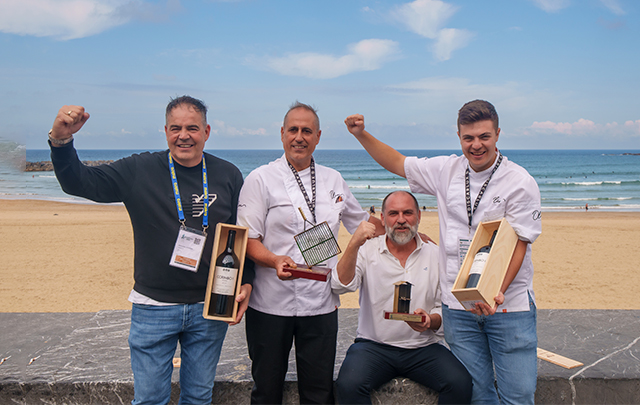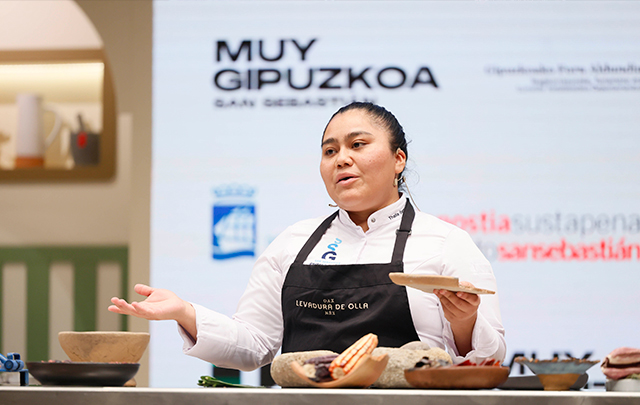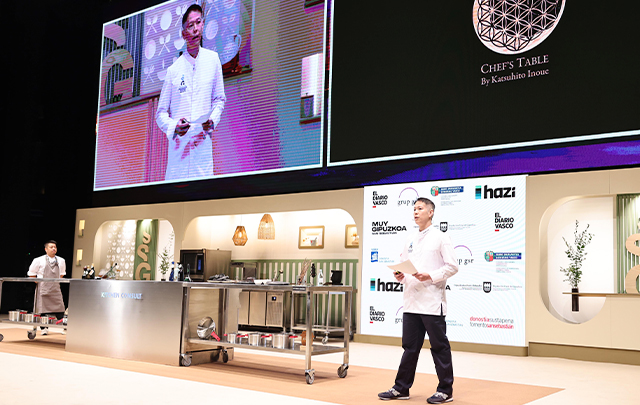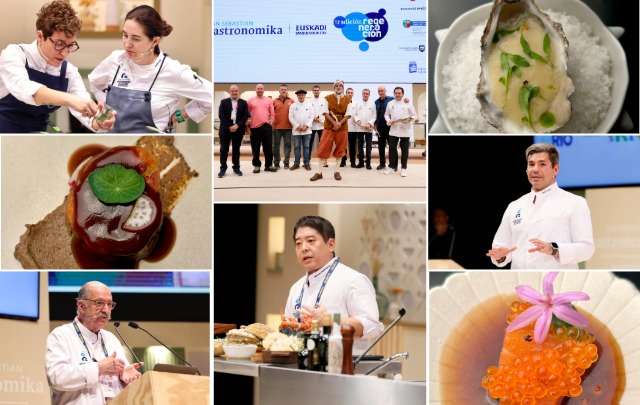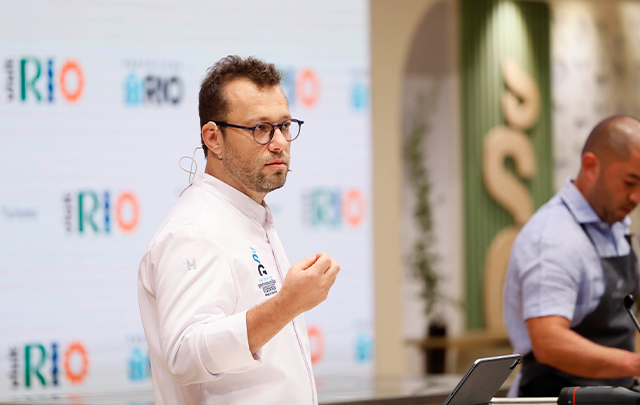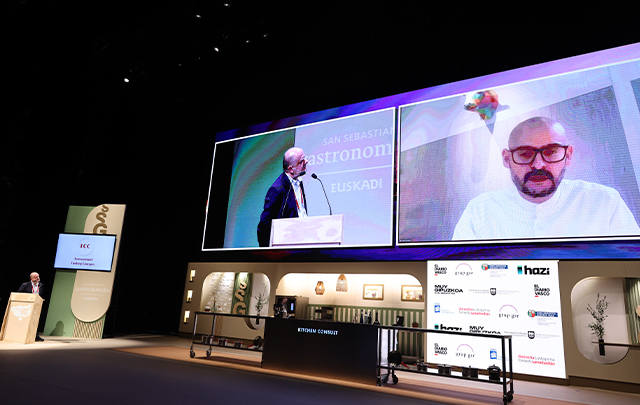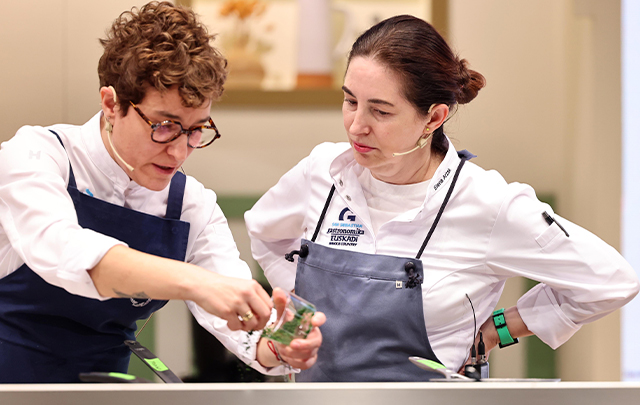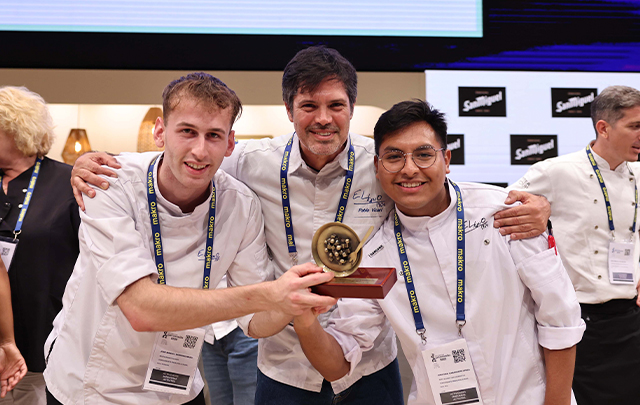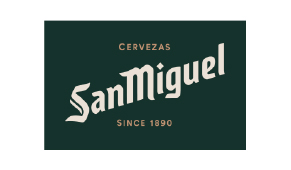News
'Roots, fire and memory': the earth takes centre stage at the start of Gastronomika 2025
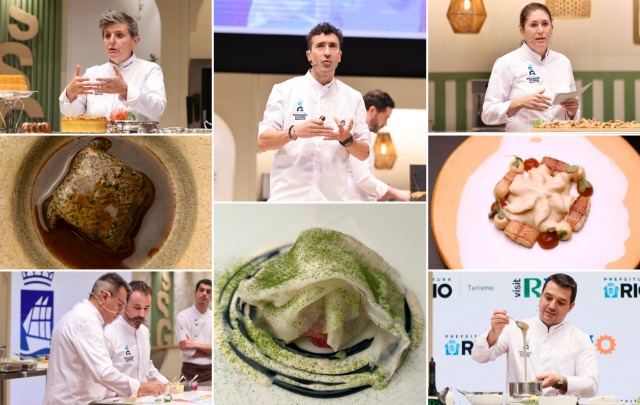
The 27th edition of San Sebastian Gastronomika – Euskadi Basque Country opened at the Kursaal today, and will host an intense three-day programme of lectures, competitions, tastings and professional meetings under the slogan 'Tradition and regeneration'. This morning, the conference centre welcomed hundreds of delegates and representatives from the culinary sector for the opening day, which officially launched the conference and recognised the careers of four leading figures in gastronomy.
Cooking up memories
Alejandro Ibáñez, Nacho Manzano and Eneko Atxa, hailing from Yecla, Arriondas and Larrabetzu respectively, took centre stage on the first day of San Sebastian Gastronomika – Euskadi Basque Country 2025. Territory, identity and time were the essential ingredients of their presentations. Three different cuisines, united by a common vision of deep roots. Ibáñez championed the cuisine of the environment and memory from Barahonda (Yecla, Murcia); Manzano paid tribute to his family roots and the Asturian landscape; and Atxa reflected on the value of time and tradition as the driving forces behind the Basque avant-garde. "The past is essential," said the Basque chef, in an allegory to culinary heritage and the pride of doing things well without rushing, from the ground up.
The morning also featured a presentation by chef Viviana Varese, who brought her own interpretation of 16th- to 18th-century aristocratic haute cuisine to the Kursaal stage. The Italian chef explained that three centuries of culinary tradition had been subjected to rigorous research, which she described as 'quite a challenge, as that cuisine is diametrically opposed to my avant-garde approach'. From her restaurant at the Passalacqua hotel on Lake Como in Italy, the Michelin-starred Milanese chef presented a gastronomic journey through European nobility, reinterpreting historical banquets with dishes such as tomato aspic, bucatini timbale with ragù and duck and foie gras pithiviers. It was a look back at the past that rescued classical splendour through research and contemporary sensibility.
Also taking part in the opening day were Oriol Castro and Eduard Xatruch from Disfrutar*** (Barcelona), who offered a masterclass full of technical innovation and creativity. They shared their new natural and non-alcoholic distillates, cold thick vegetable custards, methylcellulose gelations, and vegetable meringue spheres. They also paid homage to Brazil with an original Canary Island banana feijoada. True to their experimental spirit, the Catalan chefs once again demonstrated why their approach remains at the forefront of the global culinary scene. The Catalan trio also used the Gastronomika platform to announce that the third volume of their Disfrutar compendium is already in print and will be released in November.
Vindicating the land
The first presentation of the afternoon featured Hideki Matsuhisa (Koy Shunka*, Barcelona), Yoshikazu Yanome (Kaido Sushi Bar*, Valencia) and Takashi Okui (Tsuruga, Japan). They explored the umami-rich world of kombu, an essential ingredient in Japanese dashi broth. Okui, whose family has been involved in preserving kombu for over 150 years, explained how maturation, which can take up to two years, enhances its flavour. He drew a parallel with wine, stating that both require patience, classification and time to guarantee quality. The demonstration once again highlighted the importance of respecting time and process as fundamental to culinary excellence.
Next, Maca de Castro of Maca de Castro** in Alcudia, Majorca, championed the concept of infinite seasonality, reminding us that every product has its time and place of origin. The Mallorcan chef presented recipes that connect the sea and the land to the history of her island. These included a potato dish made with four types of native peanut and a ray dish with sea fennel hollandaise sauce, which revived almost forgotten traditional flavours. She emphasised the importance of respecting natural rhythms, restoring meaning to the gastronomic calendar, and ensuring that culinary creativity is always based on sustainability and the memory of the territory. The afternoon session of Gastronomika reignited the heated debate on summer fires and their tragic consequences in rural areas. Zamora-born chef Luis Alberto Lera of Lera** (Castroverde de Campos) said that the worst consequence is the emotional damage caused by the feeling of abandonment and falling into oblivion. 'When the fire is extinguished, we do not have enough help to recover what has been lost,' he said, denouncing 'society's complacency and excessive legal control as the main causes of the neglect of forests'. Borja Marrero, chef at Muxgo** (Las Palmas de Gran Canaria), who suffered heavy losses in the 2019 fires that ravaged his island, agreed with him. “The real fire starts when the flames are extinguished,” he said, “because of the difficulties we face in restoring the land. Here, restaurants do a great job of securing the territory, as we are recovering the rural primary sector and promoting the growth of agriculture and livestock farming, which makes forests less vulnerable.”
Chef Jeferson García (Afluente, Bogotá, Colombia) has contributed a territorial perspective, fusing haute cuisine and environmental conservation. He has highlighted his experience in Colombia, his native land, as well as in Latin America and Europe, where he has championed the flavours of his homeland by creating a culinary map of the Colombian jungle.
Next up was Benito Gómez (Bardal**, Ronda), who presented his creative cuisine with a foundation in local tradition. Finally, Rafa Costa e Silva (Lasai**, Rio de Janeiro) took to the stage, showcasing a blend of Brazilian culinary techniques and international influences. These influences include those he absorbed during his time in the Basque Country, a region for which he thanked the people for their hospitality, especially Andoni Luis Aduriz, under whom he was head chef at Mugaritz for five years. “The culture of cuisine in the Basque Country is not experienced, it is taught,” said the Rio de Janeiro native. He explained that he grows all the produce he uses to create his unique, carefree cuisine because he believes that, as chefs, they have a responsibility to use local produce and thus strengthen Rio de Janeiro's commercial ecosystem.
Finally, chef Albert Adrià (Enigma*, Barcelona) closed the day with the presentation of an innovative tasting menu that explores the intersection between mystery and revelation, thus consolidating his position as one of the most creative minds in contemporary gastronomy. “Enigma's cuisine is austere and direct with few elements on the plate, so the sauce is essential. This is how we achieve the maximum with the minimum,' explained the Catalan chef.
The winners of the 27th edition
The San Sebastian Gastronomika 2025 Tribute Award went to Heston Blumenthal, a British chef widely regarded as one of the most influential in contemporary history, as well as a pioneer of multisensory cuisine. Creator of the legendary restaurant The Fat Duck, Blumenthal was voted the world's best chef in 2005 by The World's 50 Best Restaurants. He has also been honoured by Queen Elizabeth II with an OBE for his contribution to gastronomy. The Gueridón de Oro, which recognises excellence in the world of wine, was jointly awarded to Almudena Alberca MW, a Master of Wine, and oenologist Sara Pérez, two leading figures in Spanish viticulture. Alberca is the first Spanish woman to obtain the Master of Wine title, while Pérez is a leading figure in organic viticulture in Priorat and Montsant. They both share a vision of wine that is based on respect for the land, innovation, and the active involvement of women in the industry. Meanwhile, the Pau Albornà i Torras Award for Gastronomic Journalism was awarded to José Carlos Capel, critic, founder of Madrid Fusión, and one of the most influential and respected gastronomic journalists in Spain.



